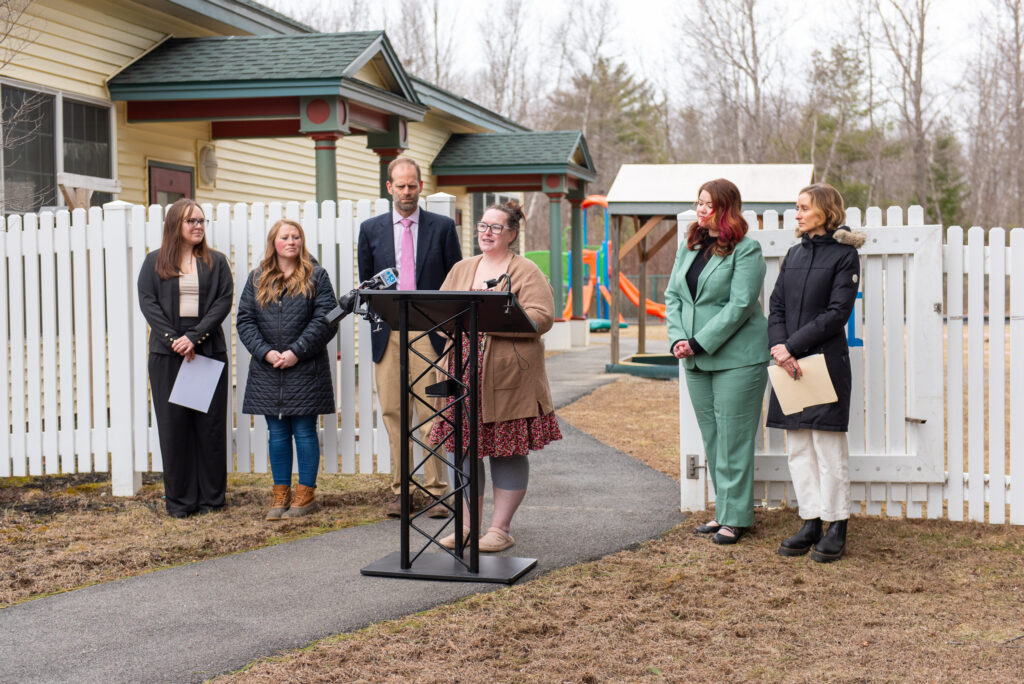Senate President Daughtry, advocates, and families urge passage of LD 1294 to expand Maine’s child tax credit
 Pictured left to right: Tabetha Thomas, Jess Charrier, Garrett Martin, Raychel Ward, Mattie Daughtry, Ann Danforth
Pictured left to right: Tabetha Thomas, Jess Charrier, Garrett Martin, Raychel Ward, Mattie Daughtry, Ann Danforth
AUGUSTA, ME — At a press conference this morning at Magic Years Center preschool in Augusta Senate President Mattie Daughtry joined advocates and Mainers with lived experience to call for the passage of LD 1294, a bipartisan bill that would expand Maine’s Dependent Exemption Tax Credit (DETC) — the state’s version of the child tax credit.
The proposed legislation would double the DETC for families with young children, providing an additional $300 per child under age six. This targeted expansion would help families cover essentials like food, rent, child care, and heating fuel — all while being revenue-neutral by phasing out benefits for the highest earners.
“At a time when our country is experiencing so much economic uncertainty, this bill helps us do the right thing for Maine people, putting money in their pockets,” said Senate President Daughtry. We know that when we support Maine families, we’re not just helping individuals; we’re strengthening the fabric of our communities.”
In 2023, 12.6% of children in Maine lived in poverty. During the pandemic, an expanded federal child tax credit cut child poverty in half and allowed families to afford food, rent, and transportation. LD 1294 aims to bring that same impact home to Maine.
“I am a strong advocate for my children, family, friends and my community,” said Tabetha Thomas, a mother of six, student at Kennebec Valley Community College, and part-time food service worker at Colby College. “I would work more but between long hours being a mom and going to school, it’s impossible to fulfill the needs of my children while still keeping up financially. Wages are not high enough to keep up with the high costs of food, housing prices and other basics. The rising costs are having a very real impact on my friends, family and neighbors. Increasing the Maine child tax credit would help my family meet the needs of food, clothing and shelter for my children.”
Families across the state are facing similar financial strain. For parents like Raychel Ward, a Maine State Parent Ambassador from Livermore Falls and mom of three, the credit is a lifeline. “Our 5-month-old son was born with hyperinsulinism. This requires frequent visits to see specialists at Children’s Hospital of Philadelphia. We were able to set aside $300 from this year’s child tax credit to cover the cost of the train while utilizing care nets to cover his treatment costs. As parents, we will always rise to the occasion and figure out what is best for our children, often sacrificing our own needs. But something like LD 1294, which helps parents with young children out at a crucial time in a family’s life, is huge.”
Jess Charrier, family services coordinator at Magic Years, said “I work with families from all over central Maine. They are facing steep barriers in the cost of housing, childcare, groceries and more. The average Maine family is working through a lot, and they deserve support.”
Ann Danforth, a senior policy advocate at Maine Equal Justice, emphasized the broader financial stress facing families across the state. “The impact of Maine’s housing crisis, inflation, and other stressors is underscored by a recent survey MEJ conducted, where over half (56%) of the more than 700 people who responded said they could not afford a $400 emergency. A targeted increase in our state’s child tax credit will give families flexibility to spend money on what they need, so they can focus on being with their kids, buying necessities for their families, paying for child care, pursuing educational opportunities, fixing their car to get to work and much more.”
Garrett Martin, president and CEO of the Maine Center for Economic Policy, highlighted the strong economic case for the expansion. “We’ve seen it work. When the federal child tax credit was expanded during the pandemic, child poverty dropped, and families spent the money on essentials — helping communities rebound faster. Research shows families use tax credits to cover basic needs — reducing financial stress, improving workforce participation, and stimulating local economies. This is an economic investment with long-term returns: higher earnings, better health outcomes, and stronger communities. And it has bipartisan support — because smart economics should never be partisan. Let’s make sure little feet get a big start. Expanding the DETC is good for families, good for our economy, and good for Maine’s future.”
Last session, lawmakers fixed a flaw in the DETC that excluded the lowest-income families. LD 1294 builds on that progress, making the credit more equitable, more effective, and more targeted to families with the greatest need.
A stronger DETC means stronger families, a stronger economy, and a stronger Maine.
A public hearing for LD 1294 is scheduled for Tuesday, April 8 at 1:00 p.m., Taxation State House, Room 127.


